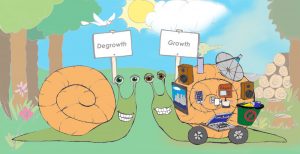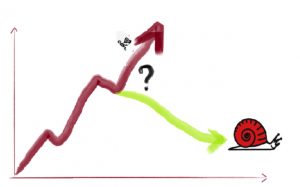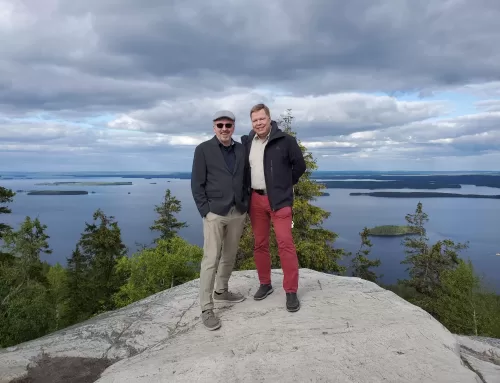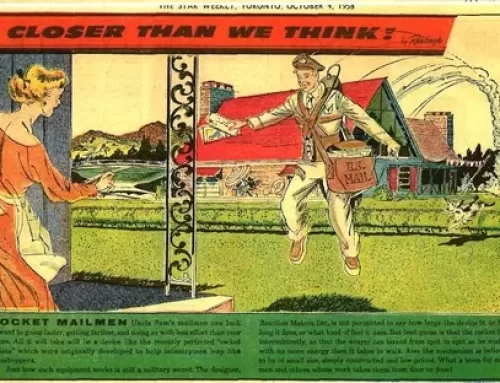 Since the 1972 publication of Donella Meadow’s Limit to Growth, many proponents of long-term future sustainability and the survival of man given the steady depletion of finite resources yet the exponential growth of populations, the deterioration of our natural environment as well as economic stagnation, among other things, have advocated for a global response that includes population control, income or wealth redistribution and/or a “fair share” consumption of available resources. Then there’s the more recent debate as to whether societies should shift to a new economic paradigm, whereby strategic ideas and political actions intersect at a point of degrowth as opposed to economic growth in order to reverse man’s plight towards an uncertain future, which in some scenarios involves economic collapse. That there now is an expanding movement in favor of a successor-system to capitalism, commonly referred to as “after capitalism“, brings to mind the thought of an alternative, perhaps, evolutionary social order that not only is preferable to some as compared to the current one shaped by industrial development, but also may conceivably be the better system if societies are to be characterized by sustainable living —arguably the outcome of a “steady-state economy“.
Since the 1972 publication of Donella Meadow’s Limit to Growth, many proponents of long-term future sustainability and the survival of man given the steady depletion of finite resources yet the exponential growth of populations, the deterioration of our natural environment as well as economic stagnation, among other things, have advocated for a global response that includes population control, income or wealth redistribution and/or a “fair share” consumption of available resources. Then there’s the more recent debate as to whether societies should shift to a new economic paradigm, whereby strategic ideas and political actions intersect at a point of degrowth as opposed to economic growth in order to reverse man’s plight towards an uncertain future, which in some scenarios involves economic collapse. That there now is an expanding movement in favor of a successor-system to capitalism, commonly referred to as “after capitalism“, brings to mind the thought of an alternative, perhaps, evolutionary social order that not only is preferable to some as compared to the current one shaped by industrial development, but also may conceivably be the better system if societies are to be characterized by sustainable living —arguably the outcome of a “steady-state economy“.
Those oriented towards “a political commitment to growth“, with expectations of limitless continuing economic growth well into the future, may someday find this existing capitalistic-influenced paradigm to be unsustainable. As historical trends sugges t, global economic growth stimulated by increasing natural resource use, both renewable and nonrenewable, as well as over-consumption has been linked to widespread environmental and social impacts. Moreover, from a purely economic standpoint, the future of economic growth seems somewhat bleak, given forecasts that suggest that on a global scale, future growth rates will not come close to what they had been in the past, but instead, will “diminish and, presumably, come to an end.” Thus, ideas are emerging of convival and participatory societies, where reduced harmful environmental and unjust social impacts engender environmental sustainability and social equity. Some believe a degrowth economy can be designed so that there are compensation-based livelihoods and opportunities for those who want them, and decentralized, democratic cooperatives for sharing resources.
t, global economic growth stimulated by increasing natural resource use, both renewable and nonrenewable, as well as over-consumption has been linked to widespread environmental and social impacts. Moreover, from a purely economic standpoint, the future of economic growth seems somewhat bleak, given forecasts that suggest that on a global scale, future growth rates will not come close to what they had been in the past, but instead, will “diminish and, presumably, come to an end.” Thus, ideas are emerging of convival and participatory societies, where reduced harmful environmental and unjust social impacts engender environmental sustainability and social equity. Some believe a degrowth economy can be designed so that there are compensation-based livelihoods and opportunities for those who want them, and decentralized, democratic cooperatives for sharing resources.
What is an important implication of a degrowth economy relative to forests futures? A sustainable degrowth economy will lead to improved ecological conditions over time, given the reduction in consumption of certain natural resources. The reduced consumption of fossil fuels, for example, will mean less carbon dioxide emissions in the atmosphere, and therefore less reliance on forest carbon sinks as a climate-change mitigator, as “forests can never cancel out or ‘offset’ emissions from fossil sources.” Rather, forest carbon sinks tend to increase the concentrations of carbon dioxide emissions that are released in the atmosphere, thereby causing further planetary warming. — Kimberly Daniels
Photo 1 source: http://degrowth.weebly.com/index.html
Photo 2 secondary source: https://entitleblog.org/2017/02/07/beyond-the-limits-of-nature-a-social-ecological-view-of-growth-and-degrowth/



